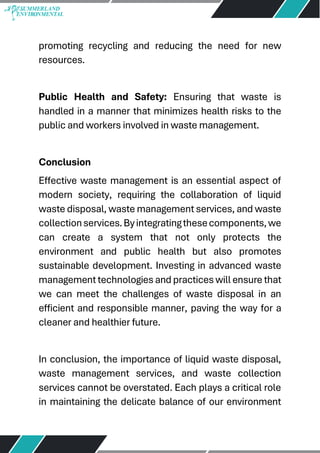5 Simple Techniques For Reclaim Waste
5 Simple Techniques For Reclaim Waste
Blog Article
Not known Facts About Reclaim Waste
Table of ContentsThe smart Trick of Reclaim Waste That Nobody is Talking AboutNot known Details About Reclaim Waste Reclaim Waste - An OverviewRumored Buzz on Reclaim WasteThe Best Strategy To Use For Reclaim Waste
Check out the types, occurrences, and forms of fluid waste. Residential sewer waste describes the waste and items from a household septic tank. This sort of waste is created by people in homes, schools, and other structures. This only consists of sewage-disposal tanks that have a drain field. The correct administration and disposal of domestic sewer waste need liquid waste to be moved to a sewer treatment plant where the appropriate methods and tools are used to purify and throw away waste.
Business waste typically consists of potential threats, such as flammable products or a mixture of fluid and strong waste products, and needs an advanced and detailed disposal procedure. The disposal of business waste usually entails the filtering of waste prior to transport to ensure risk-free and correct disposal. Industrial waste is produced from results and drainage of industrial procedures and manufacturing.
This sort of waste can not utilize the exact same sewer management transportation or procedures as septic or business liquids. The commercial waste management process needs the assessment and screening of fluid waste before it undergoes the disposal process (liquid waste disposal melbourne). Overflow waste is the liquid waste that comes from overflow and excess stormwater in extremely booming locations or cities
Runoff waste can cause contamination and flooding if not managed effectively. Find out extra about sewer cleaning and waste management. Making certain correct waste management can avoid calamities and lower ecological injury. Both individuals in household setups and specialists in industrial or production industries can gain from understanding the procedures and laws of fluid waste administration.
Reclaim Waste Fundamentals Explained
Get in touch with PROS Services today to learn more about our waste management and disposal solutions and the appropriate means to take care of the fluid waste you generate.
(https://writeablog.net/reclaimwaste1/reclaiming-resources-a-comprehensive-guide-to-industrial-wastewater-treatment)This so-called 'wastewater' is not just an essential source yet, after treatment, will be launched to our land, waterways or the sea. Used water from commodes, showers, baths, kitchen sinks, washings and industrial procedures is known as wastewater.

water made use of to cool equipment or clean plant and equipment). Stormwater, a kind of wastewater, is overflow that moves from agricultural and city locations such as roofings, parks, gardens, roads, courses and rain gutters right into stormwater drains, after rainfall. Stormwater streams neglected straight to local creeks or rivers, at some point reaching the sea.
What Does Reclaim Waste Mean?
In Queensland, many wastewater is dealt with at sewage treatment plants. Wastewater is delivered from residential or commercial websites via a system of sewage systems and pump terminals, known as sewerage reticulation, to a sewer therapy plant.
The Division of Natural Resources suggests city governments regarding managing, operating and preserving sewerage systems and treatment plants. In unsewered areas, neighborhood governments might need owners to mount specific or house sewer therapy systems to treat domestic wastewater from toilets, kitchens, restrooms and laundries. The Department of Natural Resources authorises making use of house systems when they are confirmed to be reliable.
A lot of stormwater gets no treatment. In some new subdivisions, therapy of some stormwater to get rid of trash, sand and gravel has begun making use of gross toxin traps. Wastewater therapy takes place in four phases: Eliminates solid issue. Bigger solids, such as plastics and other objects mistakenly discharged to sewers, are gotten rid of when wastewater is travelled through screens.
Uses little living organisms understands as micro-organisms to damage down and remove continuing to be dissolved wastes and fine fragments. Micro-organisms and wastes are incorporated in the you could check here sludge.
9 Easy Facts About Reclaim Waste Explained
Nutrient elimination is not available in any way sewer therapy plants due to the fact that it requires expensive specialist tools. It is becoming much more typical in Queensland. Clear fluid effluent generated after therapy might still consist of disease-causing micro-organisms. If this effluent is released into waterways such as rivers or the sea, the micro-organisms will ultimately pass away out.

This normally suggests wastewater has actually to be dealt with or impurities eliminated before it can be discharged to waterways. Most wastewater flows into the sewage system. Under the Act, neighborhood federal governments carry out authorizations and permits for ecologically relevant activities (ERAs) involving wastewater releases that could have a neighborhood influence. The division provides approvals and permits to Ages including wastewater releases that could have a local or statewide effect.
6 Simple Techniques For Reclaim Waste
Otherwise, examples are considered laboratory evaluation. Frequently many tests are needed to establish the levels of each of the various pollutants such as oils, heavy steels and pesticides in water. Monitoring provides factual details about water high quality and can confirm that permit conditions are being fulfilled. The information acquired via monitoring supplies the basis for making water top quality decisions.
Report this page